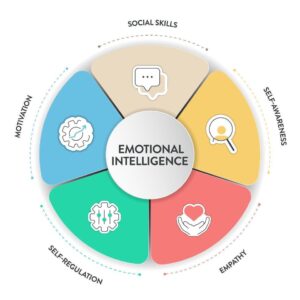Emotional Intelligence (EQ) is the ability to recognize, understand, manage, and influence emotions in yourself and others. It encompasses skills in emotional awareness, emotional regulation, empathy, and social skills. High EQ can improve relationships, decision-making, and overall mental well-being.
It includes several key components:
- Self-Awareness: Recognizing and understanding one’s own emotions. This includes being aware of how emotions affect one’s thoughts and behaviour, knowing personal strengths and weaknesses, and having self-confidence.
- Self-Regulation: The ability to manage and control one’s emotions, especially in stressful situations, and to maintain flexibility and a positive outlook. It involves self-control, trustworthiness, conscientiousness, adaptability, and innovation.
- Motivation: Being driven to achieve for the sake of achievement. This includes having a passion for work, a commitment to goals, initiative, and optimism even in the face of failure.
- 4. Empathy: Recognizing and understanding the emotions of others. This involves being able to read emotional cues, show sensitivity, and understand the perspectives of others, which can lead to better relationships and communication.
- Social Skills: Managing relationships to move people in desired directions. This includes communication skills, conflict management, leadership, influence, collaboration, and teamwork.
Emotional intelligence is considered crucial for effective leadership, relationship management, and overall success in various aspects of life. It differs from cognitive intelligence (IQ), which measures intellectual abilities, in that EI focuses on managing emotions and interpersonal relationships.

Practising Emotional Intelligence
Worksheet: Developing Emotional Intelligence
Step 1: Self-Awareness
- Identify Your Emotions
-
- Reflect on your emotions throughout the day.
- Example: “What emotions did I feel today and what triggered them?
-
- Understand the Impact of Your Emotions
-
-
-
- Assess how your emotions influence your thoughts and actions.
- Example: “How did feeling anxious affect my behaviour during the meeting?”
-
-
Step 2: Self-Regulation
- Manage Your Emotions
- Practice techniques to regulate your emotions, such as deep breathing, mindfulness, or taking a break.
- Action: “When feeling overwhelmed, take deep breaths and count to ten.”
- Stay Calm Under Pressure
- Develop strategies to maintain composure in stressful situations.
- Action: “Create a calming routine to use before high-stress events, such as listening to calming music or practising visualisation.”
Step 3: Motivation
- Set Personal Goals
- Define clear, achievable goals to stay motivated.
- Example: “Set a goal to complete a challenging project within a month.
- Cultivate a Positive Attitude
- Focus on positive self-talk and optimism.Action: “Replace negative thoughts with positive affirmations, such as ‘I can handle this challenge.’
Step 4: Empathy
- Practise Active Listening
- Fully concentrate, understand, and respond to others.
- Action: “In conversations, maintain eye contact, nod, and provide feedback to show you are listening.”
- Understand Others’ Perspectives
- Put yourself in others’ shoes to understand their feelings and viewpoints.
- Action: “Ask questions to clarify others’ emotions and perspectives, such as ‘How did that make you feel?'”
Step 5: Social Skills
- Build Healthy Relationships
- Develop strong, positive relationships with others.
- Action: “Spend time nurturing relationships by showing appreciation and support.”
- Communicate Effectively
- Practice clear and assertive communication.
- Action: “Express your thoughts and feelings openly and respectfully, using ‘I’ statements.
- Resolve Conflicts Constructively
-
- Address conflicts calmly and find mutually beneficial solutions.
- Action: “When in conflict, focus on the issue at hand and seek to understand the other person’s point of view.”
Conclusion
Developing emotional intelligence is a continuous process that involves self-awareness, self-regulation, motivation, empathy, and social skills. By practising these components regularly, you can improve your ability to manage emotions, understand others, and build strong, positive relationships. This will lead to enhanced well-being and success in both personal and professional areas of your life.
Further Reading & References:
Books
“Emotional Intelligence: Why It Can Matter More Than IQ” by Daniel Goleman
This seminal work by Goleman introduces the concept of emotional intelligence and its impact on various aspects of life.
“Emotional Intelligence 2.0” by Travis Bradberry and Jean Greaves
This book offers practical strategies for improving emotional intelligence and includes a self-assessment test.
Articles
“What Makes a Leader?” by Daniel Goleman (Harvard Business Review)
A foundational article discussing the key components of emotional intelligence in leadership.
“The Business Case for Emotional Intelligence” by Cary Cherniss and Daniel Golema
This article provides evidence of the benefits of emotional intelligence in the workplace.
Organisations
Six Seconds (6seconds.org)
A global community dedicated to teaching and promoting emotional intelligence.
